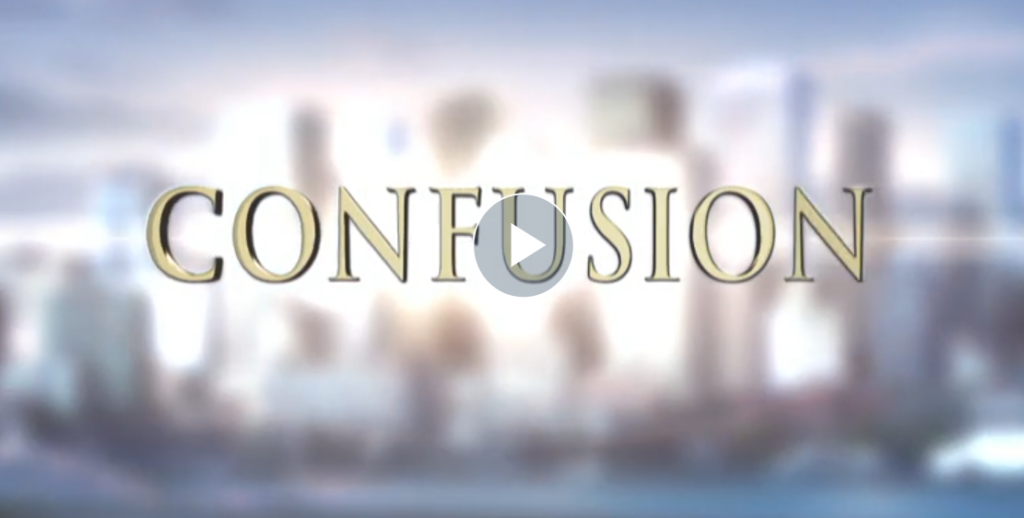Confused?
Every failure starts with confusion.
Your education, skills and experience are useless . . . if you’re confused.
Ten Signs Confusion is Hurting You
1. You can’t focus or concentrate.
2. You get angry for silly reasons.
3. You can’t decide.
4. You forget things, your mind goes blank.
5. Parts of your life are mysterious.
6. Your thoughts are stupid or senseless.
7. You feel frustrated and stopped.
8. You cannot follow directions or simple instructions.
9. You feel dizzy or clumsy.
10. You simply can’t understand what’s going on with you.
Ten Examples in Life
1. You want to make large amounts of money, but can’t figure out how.
2. One of your most important relationships is not going well.
3. Your health is slowly getting worse for no reason.
4. You are overwhelmed by negative emotions.
5. You really want to make progress, but too much is happening.
6. When you try to learn something, you feel overwhelmed.
7. You have too much information to figure out a solution.
8. A loss or disaster causes a permanent damage.
9. Your plans constantly change and never get done.
10. You would start your own business if it was not so complicated.
How to Stop Confusion
Do you understanding these four words? Check them before reading the solution.
- Datum: one fact or piece of information.
- Factor: element or ingredient.
- Particular: a single thing; separate and distinct.
- Particles: tiny pieces or parts
The solution: “Until one selects one datum, one factor, one particular in a confusion of particles, the confusion continues. The one thing selected and used becomes the stable datum for the remainder.” — L. Ron Hubbard
Four Steps to Solving Any Confusion
1. You are confused. Thoughts, tasks, emotions and ideas (particles) are flying all over the place.
2. You pick ONE factor and lock it down. Make it stop moving. Focus on it.
This is your Stable Datum. It doesn’t matter which factor you pick. Pick a particle that you like.
3. Use this single idea to organize everything else. Make it your first priority.
4. BANG! The confusion dissolves. You know what to do.
Examples
Joey Needs Food
Joey has three minutes to buy five food items, but the list is in his head. He’s never been in this particular grocery store and is immediately overwhelmed by huge size of the store with it’s thousands of things to buy.
He thinks, “What am I doing here? What do I need to buy?” Nothing comes to mind.
He then asks himself, “What is ONE THING I need? Oh, apples!”
He focuses on apples and nothing else. As soon as he grabs the apples he remembers the other four.
He gets what he needs with time to spare.
Office Meeting Chaos
Emma walks into the work meeting just as her team leader says, “Let’s brainstorm new ideas to fix our bad sales numbers!”
Instantly, the room erupts into a flurry of disconnected ideas, confused voices, clattering keyboards and papers moving around. The team leader writes a few words on the whiteboard, but is getting confused. Emma sits in the middle of the confusion and feels like she’s spinning in circles.
She asks herself, “What’s ONE THING I can do here? Hmm. Ah, coffee!”
She gets up, strolls over to the coffee table and helps herself.
She watches the group “discussion” while taking long deliberate sips.
Emma asks herself, “What is ONE THING I can do to end this chaos? Hmm, Ah!”
She says, “HEY! How about we start by finding out why sales numbers are down?”
Everyone stops talking and nods in agreement.
The team leader says, “Emma, can you take over the whiteboard?”
Marge's Car Accident
While driving to work, Marge was enjoying some music when BANG! An explosion! A powerful jolt to the side! Her world went black.
When she woke, everything was chaos. She was upside down. She smelled smoke and heard sirens!
A man yelled at her, “DON’T MOVE!” She had no idea where she was or even WHO she was.
Luckily, she had solved earlier confusions for herself and knew what to do.
Without moving, she looked around for ONE THING that was familiar. The smoke was so thick she could only see a colorful bracelet on her wrist. She stared at it and slowly remembered her daughter had made it for her that morning.
She then recognized other things. The rings on her fingers, her steering wheel, her sleeve.
The confusion slowed down and then stopped. She realized what had happened.
Even though she was still upside down, she felt much better.
Grandpa Joe's Video Call
Great-grandpa Joe tries to join a family Zoom call for the first time. The screen is filled with buttons, options, warnings, notifications and odd icons. His grandkids’ voices echo in the background, “Click the link, Grandpa!” but he’s stuck, staring blankly at his screen, utterly confused.
He decides to find ONE THING that does not confuse him. He notices the icon of his favorite app, Solitaire, and thinks, “One quick game first.”
After a quick win, Joe’s confidence is high. He goes back to the Zoom call screen, immediately sees the link to click and joins the call.
“Where were you Grandpa? We were worried about you!”
Joe says, “Hey, I’m only 15 minutes late. I’m not dead yet. Haha.”
Jill's Career Change Upset
Jill’s parents send her to college. They want her to become a doctor, but she leaves medical school to become a party planner. Her parents are furious with her.
They yell at her over the telephone and then refuse to talk to her. Because her parents had never been this angry, Jill becomes very confused. She cannot think about her parents, school, party planning or her future without getting confused.
At first, she gives up on everything and stays in bed all day. “What should I do? I just hate being a doctor, but my parents expect it.”
But then she remembers a possible solutions. She selects ONE THING that makes sense.
“I’m sure that deep down, my parents still love me despite our disagreement.”
Jill no longer feels confused and knows what to do next.
She sends her parents a nice e-mail about the weather and includes a picture of her pet cat.
Her father writes back, thanks her for the message and tells her they are sorry and will support whatever career she pursues.
Mohammed and Kanika's Marriage Mess
After ten years of marriage, Mohammed and Kanika argued every day.
“You don’t need to tell me how to fix your eggs every morning, okay?”
“Why doesn’t your brother get a job instead of asking for loans?”
“I wish you understood the truth about politics!”
“Glad we didn’t have any kids.”
“Stop ignoring me!”
Finally, Mohammed and Kanika hit bottom. They felt lost in the confusion of their relationship, unsure of how they had gotten to this point and even less sure of how to fix it. They were thinking about getting a divorce.
Kanika said, “What is ONE THING we can agree on?”
Mohammed suddenly remembered how they used to go for walks together. “How about a walk?”
Kanika said, “Good idea.”
They both smiled and started their walk. Without saying anything, they both felt the confusion lift and held hands.
They apologized to each other and talked more openly than they had in months.
Powerful Success Skill: Manage Your Priorities
You can boost your performance and income by picking your next action as your ONE THING. Instead of messing around with low-value tasks, go for the biggest effect you can create with these three steps.
- Write down a problem, situation or project that is on your mind. It can be anything that is difficult, disorganized or confusing.
- Write down the result you wish to accomplish.
- What is the optimum conclusion?
- If everything goes well, what will happen with this problem, situation or project?
- What would make you feel you resolved the problem or completed the project?
- Write down the NEXT PHYSICAL ACTION STEP you need to take. This is your stable datum for maximum success.
- What can you do right now?
- What act will move you closer to the optimum condition?
- If you had nothing else to do besides work on this project, what single thing would you do?
“Schedule a meeting” is too vague. Instead, be specific. Examples: “Tell Jack to find the Smith file.” “Watch the training video.” “Buy a box of folders.” “Make ten calls by noon.” “Clean out the closet.” “Train Nancy to answer all calls with good manners.”
Selecting a specific action puts you in charge. You feel some control of the situation. You don’t even need to do the action; just working it out gives you a stable datum and blows off the confusion.
Example
Your finances are a mess. You do not know how much money you have or whom you owe. Your bills do not get paid on time. Your personal and business finances are mixed together. You are so worried and confused, you avoid the problem.
You take one minute and write down the following:
“1. Situation: My finances are a confused mess.”
“2. Objective: Organize my finances so I pay my business bills properly.”
“3. Action Step: Before doing anything else, go online and open a new checking account for business purposes only.”
Suddenly, your head clears up. You no longer worry about the big confusion; you just focus on opening a new bank account. You select a stable datum and stop the confusion.
Any action step can act as the stable datum: “Buy a calculator.” “Put all my bills in one folder.” “Cut up my credit cards.” The action step does not even need to be the BEST action step to erase the confusion; any action step or any stable datum is fine.
You have correctly selected a stable datum when you no longer feel confused and see a clear path to your success.
Six Benefits
- Working out a stable datum for the confusion helps you organize your thoughts.
- As soon as you have time to work on the project, you have a starting point. You can focus on one specific act, not a big cloudy mess.
- You feel less stress and more confidence.
- You feel motivated and energized to take action.
- You become smarter; you make better decisions.
- You are one step closer to your goals and ultimate success.
So what confusions are slowing down your success?


